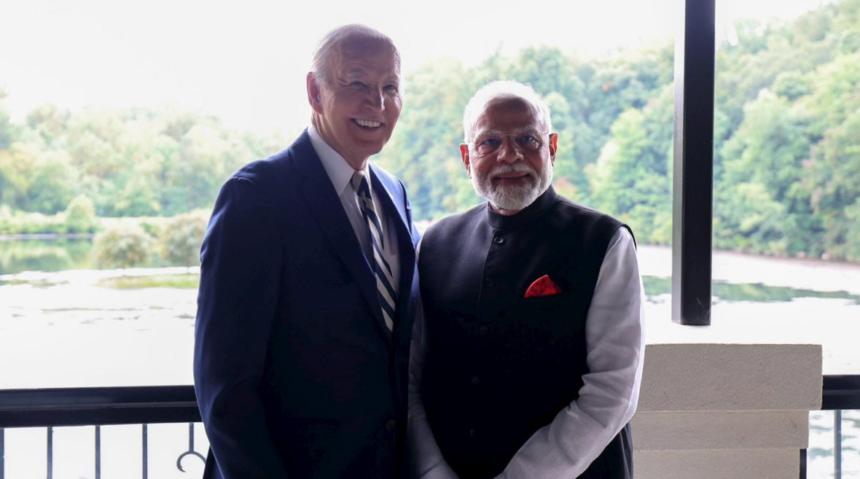In Wilmington an increasingly interconnected and dynamic global political landscape, bilateral meetings between world leaders play a crucial role in shaping international relations. Prime Minister Narendra Modi’s recent meeting with U.S. President Joe Biden in Wilmington, ahead of the Quad Summit, marked a significant moment for Indo-U.S. relations. This meeting, attended by key figures from the Indian side such as External Affairs Minister S. Jaishankar, Foreign Secretary Vikram Misri, and India’s Ambassador to the U.S. Vinay Mohan Kwatra, sets the stage for future cooperation between these two global powers, particularly within the framework of the Quad.
Interestingly, National Security Advisor (NSA) Ajit Doval, a key figure in India’s strategic and defense planning, did not accompany Prime Minister Modi on this visit. However, his absence did not overshadow the strategic depth and broad agenda discussed between the two leaders. This blog delves into the significance of this high-profile meeting, the current state of Indo-U.S. relations, the role of Quad in global politics, and how this meeting shapes the future of international collaboration in the Indo-Pacific region.
The Context of the Modi-Biden Meeting
This meeting between Prime Minister Narendra Modi and President Joe Biden takes place at a time of increasing geopolitical uncertainty, with both nations looking to strengthen their strategic partnerships. The primary focus of their discussions revolves around enhancing bilateral cooperation, particularly in the defense, technology, trade, and healthcare sectors. This comes against the backdrop of the Quad Summit, a significant event in international relations that brings together leaders from India, the United States, Japan, and Australia to discuss collaborative strategies, particularly in the Indo-Pacific region.
The Indo-Pacific has emerged as a region of strategic importance for both India and the United States. China’s assertive policies, particularly in the South China Sea, have drawn concern from global powers, prompting the Quad nations to form a collaborative front to promote stability, peace, and freedom of navigation. The meeting in Wilmington served as a precursor to broader discussions about Indo-Pacific security and the role of the Quad in countering regional challenges.
Key Attendees: A Strong Indian Delegation
Prime Minister Modi was accompanied by a strong delegation, which included External Affairs Minister S. Jaishankar, Foreign Secretary Vikram Misri, and India’s Ambassador to the U.S., Vinay Mohan Kwatra. Each of these officials plays a pivotal role in India’s foreign policy, and their presence underscored the importance India places on its relationship with the United States.
External Affairs Minister S. Jaishankar, Wilmington with his extensive diplomatic experience, has been a critical player in shaping India’s external relations. His presence highlighted the significance of this bilateral meeting, given his deep understanding of global dynamics and the changing nature of U.S.-India relations.
Foreign Secretary Vikram Misri, having previously served as India’s Ambassador to China, brings invaluable insight into India’s strategic thinking on China and the Indo-Pacific. His presence likely provided a deeper understanding of India’s diplomatic stance and strategic priorities.
Vinay Mohan Kwatra, India’s Ambassador to the United States, has played a crucial role in enhancing Indo-U.S. ties during his tenure. His presence emphasized the importance of diplomacy in cementing this relationship, especially in light of upcoming Quad discussions.
However, Wilmington the absence of National Security Advisor Ajit Doval, a veteran in India’s security architecture, was a notable aspect of the meeting. Doval’s involvement has been pivotal in shaping India’s defense strategies, and while his absence was unexpected, it could indicate that the discussions may have focused more on economic, technological, and diplomatic aspects rather than hard security.
Indo-U.S. Relations: A Growing Partnership
The Wilmington meeting between Modi and Biden signifies the importance of Indo-U.S. relations, which have grown substantially in recent years. Both countries share common interests in a range of areas, from defense to climate change, and are working together to address global challenges. One of the cornerstones of this relationship is the Indo-U.S. defense partnership.
Defense Cooperation: The Wilmington U.S. and India have strengthened defense ties through agreements such as the Communications Compatibility and Security Agreement (COMCASA) and the Basic Exchange and Cooperation Agreement (BECA). The U.S. has also been a key supplier of defense equipment to India, with deals for Apache helicopters, Chinooks, and other advanced military hardware. The growing defense partnership has positioned India as a major strategic partner for the U.S. in South Asia.
Economic Ties: India and the U.S. also share strong economic ties, with bilateral trade reaching over $100 billion in recent years. The U.S. is one of India’s largest trading partners, and the two countries are working towards enhancing trade and investment flows. The potential for greater economic cooperation was likely a key agenda item during the Modi-Biden meeting, especially in sectors like technology, digital trade, and clean energy.
Technology and Innovation:Wilmington Technology plays a critical role in the Indo-U.S. partnership. The two countries have been collaborating on projects related to artificial intelligence, 5G, and space exploration. During the Wilmington meeting, both leaders likely discussed further collaboration in these areas, especially in the context of global competition with China in technology and innovation.
Climate Change and Sustainability: Both India and the U.S. have committed to addressing the global climate crisis. India’s ambitious renewable energy goals align with the Biden administration’s focus on sustainability and clean energy. The meeting in Wilmington provided an opportunity to discuss further cooperation on clean energy projects and climate change mitigation strategies.
The Quad: A Strategic Forum
The Wilmington Quad, consisting of India, the U.S., Japan, and Australia, plays a pivotal role in the Indo-Pacific strategy. This informal strategic dialogue has become a key platform for addressing regional security concerns, particularly in response to China’s growing influence in the region.
One of the main objectives of the Quad is to ensure a free and open Indo-Pacific, where the rule of law, freedom of navigation, and respect for territorial integrity are maintained. The Quad is also focused on addressing non-traditional security threats, such as cybersecurity, climate change, and pandemic response.
The Wilmington Quad Summit provides an opportunity for India and the U.S., along with Japan and Australia, to coordinate their policies and actions in the region. Modi and Biden’s meeting ahead of the summit sets the stage for a unified approach to addressing the Indo-Pacific’s strategic challenges.
The Indo-Pacific: Countering China’s Assertiveness
The rise of China as a global power, coupled with its aggressive stance in the South China Sea and other parts of the Indo-Pacific, has been a cause of concern for both India and the U.S. China’s Belt and Road Initiative (BRI) and its increasing militarization of disputed territories have prompted countries like India, the U.S., Japan, and Australia to enhance their collaboration to counterbalance Chinese influence.
During their Wilmington meeting, Modi and Biden likely discussed strategies to promote peace and stability in the region, ensuring that the Indo-Pacific remains a zone of free trade and secure maritime routes. India’s role as a regional power, along with its strategic location, makes it a critical player in the Indo-Pacific strategy, and its partnership with the U.S. is essential to maintaining a balance of power in the region.
The Future of Indo-U.S. Relations
The Modi-Biden meeting in Wilmington is yet another milestone in the long-standing partnership between India and the U.S. As both countries continue to enhance their cooperation in various sectors, the relationship is expected to grow stronger in the coming years. The Quad Summit will further solidify this partnership, particularly in the context of the Indo-Pacific strategy and the challenges posed by China’s rise.
Areas of Future Collaboration:
- Defense: Enhanced defense cooperation, joint military exercises, and technology transfers.
- Technology: Collaborations in artificial intelligence, space, and cybersecurity.
- Climate Change: Joint efforts to combat climate change and promote clean energy.
- Trade: Strengthening bilateral trade and reducing barriers to investment.
- Regional Security: A shared commitment to peace and stability in the Indo-Pacific.
Conclusion
Prime Minister Narendra Modi’s meeting with President Joe Biden at Wilmington ahead of the Quad Summit was not just a formal engagement, but a reaffirmation of the growing strategic partnership between India and the United States. This meeting sets the tone for enhanced collaboration in areas like defense, technology, trade, and climate change, while addressing regional challenges posed by an assertive China. As the Quad Summit approaches, the foundation laid by this bilateral meeting will prove critical in shaping the future of the Indo-Pacific region and global security. ALSO READ:- Indian Teams Rack Up Draws in the Ninth Round: A Day of Mixed Fortunes at the Chess Championships 2024





